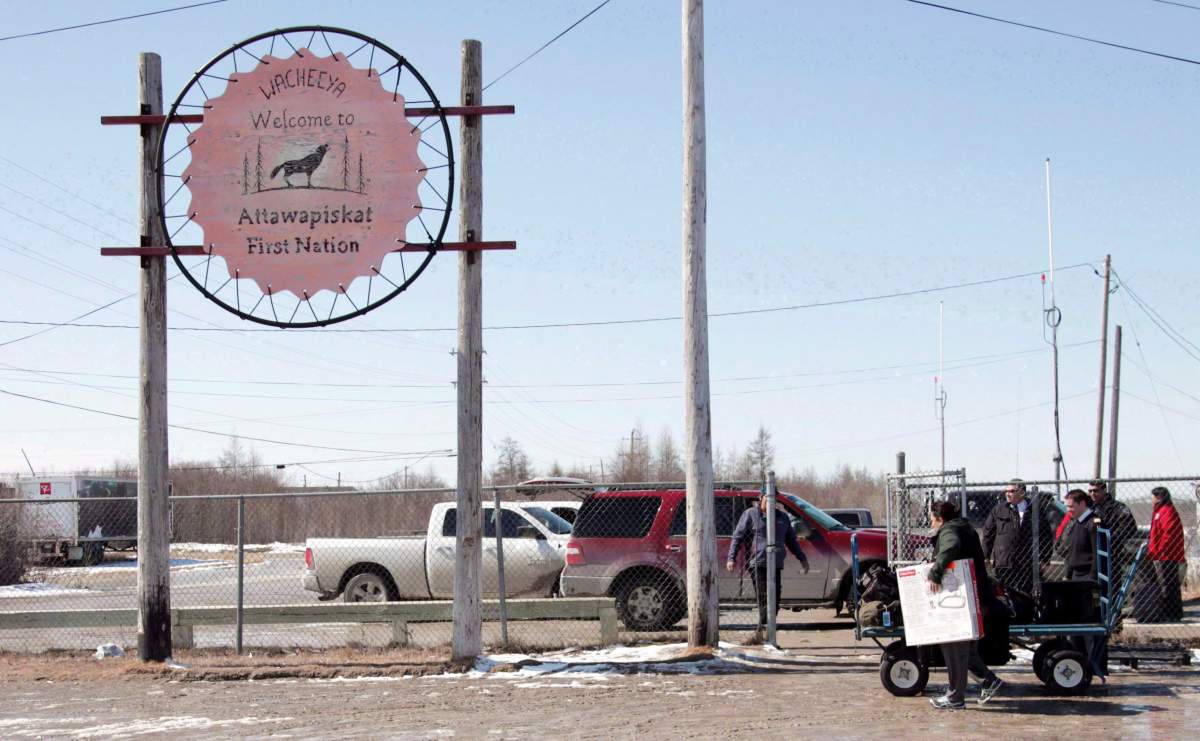A state of emergency has been declared in Attawapiskat, Ont., after tests of drinking water showed potentially dangerous levels of chemicals that develop during chlorination.

The declaration was issued Sunday after recent tests of the water system by the First Nation and Inuit Health Branch (FNIHB) found rising levels of trihalomethanes (THMs) and haloacetic acids (HAAs). The chemicals are byproducts of the water disinfection process where chlorine is used to control contaminants in drinking water. At certain levels, they are considered carcinogens.
Residents of the northern community were called to an emergency meeting on Friday where they were told to limit showers and not to use the water from their pipes to wash food.
In the water quality results, provided to Global News by Attawapiskat Chief Ignace Gull, the FNIHB noted that the THMs can escape from the water into the air, and recommended that residents ventilate rooms where water is running.
In the meantime, residents can access and collect safe drinking water from a separate system.
WATCH: Report says federal government not doing enough to address First Nations water crisis

New attention was drawn to the water crisis over the weekend when Chelsea Jane Edwards, an Attawapiskat resident and Indigenous rights activist, issued a fiery response to Catherine McKenna on Twitter.

Get daily National news
The environment minister tweeted her “love” for Ottawa’s tap water quality on Sunday.
“Do you know it’s rated among the best in the world?” she said, including a photo of her refilling a reusable water bottle.
Edwards wasn’t a fan.
“Must be nice,” she responded.
“Maybe consider visiting Attawapiskat, a northern community in Ontario, and try filling your water bottle here using our tap water? It just causes cancer if using it long term. No biggie.”
Edwards, who has a four-month-old son, expressed fear about how the water quality will impact her family.
McKenna also got a response from Attawapiskat resident Adrian Sutherland. He tweeted a photo of himself wearing a respirator mask and tagged the prime minister, federal party leaders and McKenna.
“So I hear Ottawa’s real proud of having the cleanest drinking water in the world!” he tweeted.
“Meanwhile in Attawapiskat the water is contaminated.”
NDP MP Charlie Angus, whose northern riding includes Attawapiskat, called on the federal government to “prevent this from dragging on.”
He said the “stinginess of government repairs” to the water plant has left the community suffering.
“The community has dealt with bad water for years while the government promises small band-aid fixes,” Angus wrote on Facebook.
“A total overhaul or replacement of (the) water system is needed.”
WATCH: Trudeau says government ‘on track’ to fulfill clean water promise

The water filtration system in Attawapiskat is not capable of removing contaminants from the water, levels of which are already high, according to a report prepared for the emergency meeting, posted to Twitter. According to the report, this “causes problems when the water is chlorinated.”
The THMs and HAAs cannot be removed by boiling water.
“Longer-term exposure to higher levels of THMs increases the risk of certain cancers and potentially skin irritation/complications,” the report reads.
Angus described Attawapiskat as “Flint North,” likening the situation in the northern Ontario community to a longstanding crisis in Michigan, where residents of a small town have been without clean drinking water for five years.
“The government must start shipping bottled water into the community,” he said, pointing his demands directly at Indigenous Services Minister Seamus O’Regan.
“There must be a full testing of all houses (so far very limited samples have been taken). There needs to be a team of experts who can meet with the community and go through the health threats.”








Comments